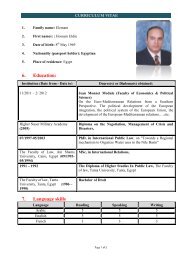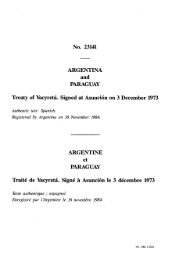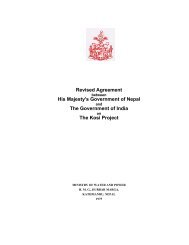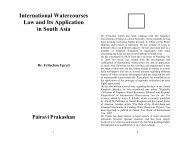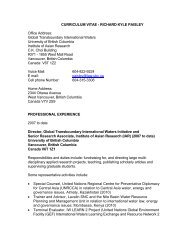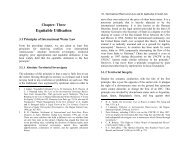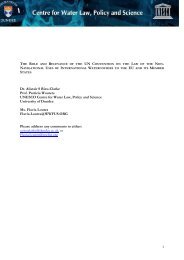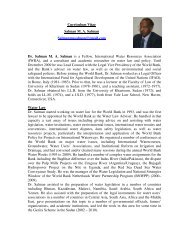Upreti, Trilochan, International Watercourses Law and Its Application ...
Upreti, Trilochan, International Watercourses Law and Its Application ...
Upreti, Trilochan, International Watercourses Law and Its Application ...
Create successful ePaper yourself
Turn your PDF publications into a flip-book with our unique Google optimized e-Paper software.
Equitable Utilisation / 127 128 / <strong>International</strong> <strong>Watercourses</strong> <strong>Law</strong> <strong>and</strong> <strong>Its</strong> <strong>Application</strong> in South Asiadevelopment <strong>and</strong> life st<strong>and</strong>ards of the North <strong>and</strong> South is huge<strong>and</strong> the poverty in the South is terrible. There are billions ofpeople who are living below the $ 1 daily income <strong>and</strong> they aredeprived of the minimum amenities of life. The concept ofachievement of the target of halving world poverty by 2015 isbased on the idea of distributional equity in which it is certainlypossible to justify the notion of preferential treatment fordeveloping states. 70 As described below, the notion ofenvironmental protection <strong>and</strong> sustainable development in whichthe developed world is required to provide more funding <strong>and</strong>technology to developing countries to carry out sustainabledevelopment stresses the idea of distributive justice.Equity has developed into a major legal system encompassingthe civil <strong>and</strong> common-law systems, albeit the two system’sapproaches differ. The common law system developed inEngl<strong>and</strong> as a separate system of law with its own normativestatus. Equity is not only a principle but also a collection ofrules. As described by Rossi“the common law eventually freed equity from itsrestrictive function ‘as a means of correcting specificlaws’ <strong>and</strong> in so doing, made equity ‘an independentsource of fresh rules of law’ <strong>and</strong>, indeed, a newsystem of law". 71Equity provides international tribunals with a discretionary(widely accepted) means of avoiding negative effects <strong>and</strong> somelacunae in the law. 72 Equity has become an indispensable partof modern democracies <strong>and</strong> their judicial, political <strong>and</strong> social70 Department of <strong>International</strong> Development (DFID), Halving WorldPoverty by 2015, London: 2000, pp.20-22. Also see supra note 67, pp.10469-10484.71 C. Rossi, Equity <strong>and</strong> <strong>International</strong> <strong>Law</strong>, New York: TransnationalPub., 1993, p. 32; this above quotation refers to the writing of the juristGustav Radbruch.72 Ibid. p. 38; also see D. Browne (ed), Ashburner’s Principles of Equity,London: Butterworth, 1933, p. 10systems in order to ensure greater fairness <strong>and</strong> justice. It isimbued with such elements as are needed for the achievementof broader goals in order to abate hindrances to the commonaspirations of the people in a modern liberal world. Equity isnot to be construed as Statutes, but rather as a general basisaround which much of the law of it has been formed. Itfrequently appears as part of reasoning in judgements, <strong>and</strong> hasrelevance to the law of trusts. 73 Equity should be considered notonly as an individual rule but also as a collection of principleswhich are often referred to as rules of equity.3.5 Types of EquityAside from distributive equity, which is perhaps best describedas an emerging norm, the use of equity in jurisprudence hasoften been divided into three types, equity infra legem, equitypraeter legem <strong>and</strong> equity contra legem. 74 Some commentatorshave argued that a decision ex aequo et bono is a fourthcategory, which is envisaged in Article 38(2) of the Statute ofthe ICJ. 75 The notion of equity has evolved <strong>and</strong> become anindispensable part in the major legal systems of the world. As aresult, it is now widely recognised as a source of internationallaw. Article 38 of the ICJ provides:“the court whose function is to decide in accordance withinternational law such as are submitted to it, shall apply:c. The general principles of law recognised by civilisednations;”73 P. Todd, Cases <strong>and</strong> Materials on Equity <strong>and</strong> Trusts, London:Blackstone, 1996, p. 1.74 V. Lowe, “The Role of Equity in <strong>International</strong> <strong>Law</strong>” (1992) in 56AYBIL, p. 56-57.75 Supra note 69, p.570. Frank <strong>and</strong> Sughrue have correctly argued it asfourth type of equity.



